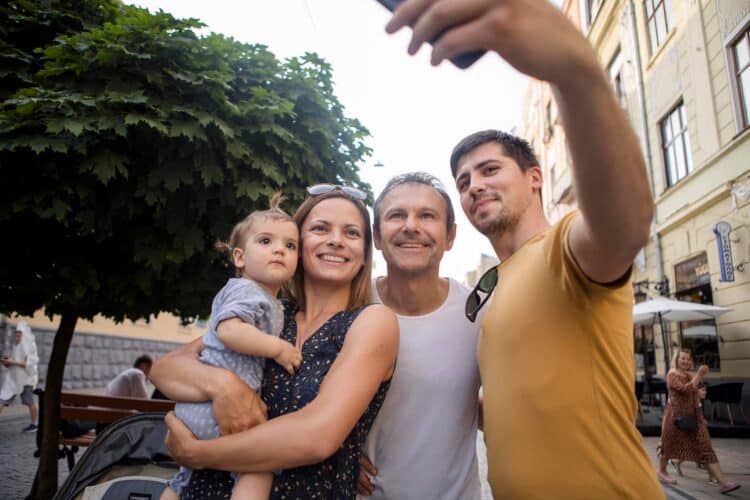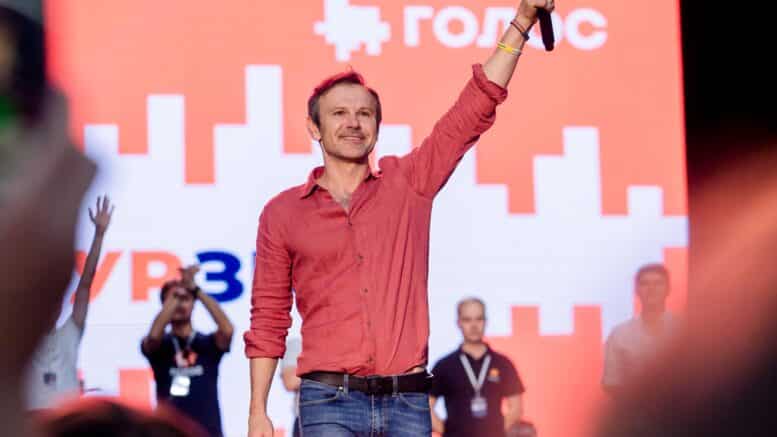Svyatoslav Ivanovich Vakarchuk is best known as the lead singer of Okean Elzy, arguably Ukraine’s most popular and successful rock band. He has long used his popularity to speak out about social and political issues. As early as 2008, for instance, he was ranked as one of Ukraine’s 100 most influential people by the Ukrainian magazine Korrespondent. Recently, however, he has further capitalized on his celebrity status to found the Voice political party. Campaigning on a pro-EU, antiestablishment, and anticorruption platform, that party recently won about 4% of the seats in the Ukrainian parliament. Vakarchuk himself now occupies one.

Svyatoslav Vakarchuk, in the white t-shirt, is the founder of Voice. Here, he is shown stopping for a selfie with a young Ukrainian family. Being close to the people and being anti-establishment were two cornerstones of Voice’s successful bid to enter Ukraine’s parliament.
Early Life and Education
Svyatoslav Vakarchuk was born in Mukachevo, a Ukrainian city near the Hungarian border, in May of 1975. His father Ivan Vakarchuk was a well-known physicist and former Minister of Education. His mother was also a university physics professor.
Vakarchuk attended Lviv Secondary School (now Lviv Linguistic High School) where he participated in KVN, an organization launched under the USSR that features comedy and theatre competitions and which still helps launch the careers of many entertainers in post-Soviet countries (including that Volodymyr Zelensky, now Ukraine’s president). Vakarchuk also helped found the school theater and played on the basketball team. He graduated with a silver medal for his advanced study of English.
After the fall of communism in 1990, Vakarchuk participated in an international exchange program in Canada. When he came back, Vakarchuk brought with him a large collection of rock music from abroad.
In 1991-1994 he followed in his family tradition and studied theoretical physics at Lviv University. In 1994, however, he joined an art rock band called The Silence Clan, which eventually became Okean Elzy. Vakarchuk writes many of the songs and is the lead singer.
In 1996, he did a postgraduate course at the Department of Theoretical Physics at the same university and moved to Kyiv after graduation in 1998.
In 2009, he wrote his dissertation on Supersymmetry of an Electron in a Magnetic Field and earned a Ph.D. in Physical and Mathematical Sciences from the Institute of Condensed Matter Physics at the National Academy of Sciences of Ukraine.
In addition to Ukranian, Vakarchuk also speaks Russian, English, and Polish.
Early Career
Vakarchuk’s band Okean Elzy moved with him to Kiеv in 1998, where they recorded their debut record, Where We Are Not (Там, де нас нема) — a reference to the equivalent Ukrainian proverb that teaches us that “The grass is always greener on the other side.” This first release became a hit and the band has released a prolific stream of music ever since. By 2007, they were named the Best Live Band in the Commonwealth of Independent States.
In 2005, Vakarchuk was the first participant of the Ukrainian version of Who Wants to Be a Millionaire? (Хто хоче стати мiльйонером?) to correctly answer every question asked. He donated his winnings of one million hryvnias (then approximately $200,000) to orphanages in Ukraine. In 2005, Vakarchuk also won the title of The Most Beautiful Ukrainian by Viva! magazine, an award for his work to “create a more beautiful life in Ukraine.”
In addition to being a musician, Vakarchuk has long been a social activist. In 2003, he became an Honorary Ambassador of Culture in Ukraine, a state-sponsored position. In 2005, he became a Goodwill Ambassador of the United Nations Development Programme for Youth in Ukraine. In 2009, he founded a charity foundation called People of the Future (Люди Майбутнього), whose goal is to support youth education in Ukraine.
Above: Ocean Elzy performing the song “Get Up” at the Euromaiden Concert in 2013
In 2013, Okean Elzy came out in support of the Euromaidan protests and even performed for the crowds gathered there. A year after, Okean Elzy marked its 20th anniversary by performing at the Olimpiyskiy National Sports Complex, the biggest stadium in Ukraine and broke the record for the number of people attending a concert by a Ukrainian band – over 75,000.
Parliamentary Activities
Svyatoslav Vakarchuk first ran for office in 2007with the Our Ukraine – People’s Self-Defense Bloc (NU-NS), then led by Viktor Yushchenko, who had been swept to power by the pro-Western Orange Revolution. Vakarchuk was a member of the Parliamentary Committee on Freedom of Speech and Information and a member of inter-parliamentary liaison groups with representatives of the Russian Federation and other countries.
During his short term, Vakarchuk did not submit any legislative bills and submitted only two amendments. He also missed 56 of 127 plenary meetings. Deputy absenteeism would be a major campaign issue by the time Vakarchuk ran for parliament again in 2019.
In 2008, infighting between President Yushchenko and Prime Minister Yulia Tymoshenko lead to the collapse of the ruling coalition. In response, Vakarchuk resigned from the Verkhovna Rada. “I was really frustrated by the level of mutual fights, at the absurd Hobbesian world of all against all, rather than changing the country for the better,” Vakarchuk then told The New York Times.
The 2019 Ukrainian Presidential Election
Rumors began in 2017 that Vakarchuk would run for president in 2019. Officially, he dismissed these rumors. He stated that the presidency was of no interest to him and that he was more interested in effecting “real changes.” However, Vakarchuk also maintained very active social media sites on which he seemed to comment negatively about all other candidates – including the increasingly popular Zelensky. This is also common for any individual considering candidacy as a way to set themselves apart from all others in the field.
Vakarchuk had also made several moves that strengthened his resume as a politician and which made many in the public see him as a potential candidate. As early as 2015, he joined an international fellowship program at Yale University that has been a stepping stone for many international political leaders. Then, in the fall of 2017, he joined Stanford’s Center on Democracy, Development and the Rule of Law as a visiting scholar. In September 2018, he spoke at the 15th Yalta European Strategy (YES) Annual Meeting, calling on people who are trusted by society to take powers in their hands. He stated, “I am ready to change the country. I do not think that to ‘play politics’ is the proper name for the things we are talking about now. I am tired of those political games. They have been being ‘playing politics’ for the last 27 years, and I do not want us to ‘play politics,’ I want us to do something.”
According to various opinion polls, from early 2017 until late 2018, Vakarchuk was a strong candidate for president, often placing in the top 3-5 candidates in a heavily populated field. However, he achieved these results while officially denying his candidacy, meaning that if he declared his candidacy, his numbers would likely up as he would be taken more seriously and could begin formally campaigning.
However, in January, 2019, just months before the election, Vakarchuk made a formal announcement via his YouTube channel that he would neither run nor back any candidate. He disappeared from the polls at that time.
Vakarchuk’s formal announcement not to participate in the 2019 Ukrainian Presidential race
Political Party
On May 15, 2019, a few weeks after the presidential elections, Vakarchuk posted on his Facebook page, “Friends, come to the observation deck tomorrow near the Museum of Ukrainian History to hear a new voice with me.”
The next morning he announced the creation of his new political party, Voice(Голос)at that spot. He mentioned the five key points of his party program: “First, the interests of the citizens of Ukraine – come first of all. Second, the existential choice of Ukraine is Europe. Third, there most be one law for all. Fourth, we must have a free economy without oligarchs. Fifth, the government must be accountable to the citizens of Ukraine.” The party counted among its initial supporters several other celebrities and well-known anti-corruption activists. Vakarchuk also declared that Voice would participate in the 2019 Ukrainian parliamentary elections.
Initially, his party polled at under 1%. Vakarchuk had polled much higher in presidential polls. However, now he was in competition with the vastly popular and also brand-new Servant of the People Party, led by Volodymyr Zelensky. Zelensky, a former comedian, had just been elected president in a landslide following a massive wave of antiestablishment support similar to what some analysts speculated Vakarchuk could have received.
The party platform for Servant was very similar to that offered by Voice. Further, many supporters had felt disappointed that Vakarchuk did not run for president and it was not immediately clear what Vakarchuk’s role in the new party would be.
While Vakarchuk espoused many ideas both through speeches and through his music, he seemed not to want to see that change enacted through any means other than a general shift in the population, without any one person able to take credit. Meanwhile, most of his fans wanted to see him personally involved in enacting his ideas.
Through heavy campaigning, Vakarchuk soon raised his party’s polling numbers. He established himself as the very visible face of the party. Vakarchuk’s band Okean Elzy performed in a string of promotional events, using Vakarchuk’s music, which often speaks to issues of patriotism and unity, to help set his campaign tone and reinforce the general ideas of his platform. Finally, he agreed to head Voice’s party lists and was officially elected party leader just days before the election, to create maximum PR effect.
Above: Vakarchuk’s Voice party (Голос) before the2019 Ukrainian Parliamentary Elections
Vakarchuk also made a clear differentiation between his party and Servant through his long-time role as a strong advocate of Ukrainian culture. He is often pictured wearing traditional Ukrainian clothing and has publically supported the controversial language law that made Ukrainian the only national language of Ukraine. Zelensky campaigned on reviewing that law. Thus, it became clear that Voice, while similar to Servant in most stances, would more decidedly endorse and support Ukrainian culture, in contrast to Servant’s more conciliatory tone between Ukraine’s various cultures.
When the election was held on July 29, 2019, Voice received 5.82% of the vote, mostly concentrated around Lviv – Vakarchuk’s hometown and a center of both EU-support and Ukrainian nationalism. The party now controls the smallest representation of the parliament’s five political parties, with 20 total seats.
Vakarchuk has continued to keep his distance from Zelensky and the now-ruling Servant of the People Party. There was much talk of a possible alliance between Voice and Servant, based on their similar platforms, and even talk that Zelenksy could make Vakarchuk prime minister in such an alliance. Although closed-door talks did take place between the two leaders, Vakarchuk has chosen specifically to take his party into the opposition. He also continues to criticize Zelensky as he did during the presidential campaign – pointing to Zelensky’s close relationship to oligarchs and his apparent softness on promoting Ukrainian culture. He has also maintained a stronger stance on Russia – advocating for a tough foreign policy stance to be enshrined in legislation.
Vakarchuk has so far supported most of Zelensky’s legislative reforms, however. With a small parliamentary faction – and one that is relatively politically isolated from other opposition parties – it is unlikely that Voice can become a driving legislative force on its own. Vakarchuk, although maintaining a passionate following, also lacks experience in drafting and passing legislation. Lastly, his party lacks the resources that Zelensky’s large party controls.
Voice and its leader are likely to try to maintain an independent identity and voice. Vakarchuk also remains hopeful. When asked about his place in parliament, he has said that “I believe that today it is a place where real changes are being made…that’s why I made the decision to go to parliament.” When asked about whether he would have wanted to become president, he responded, that “thepresident proposes change, and we’re calling for bigger change.”
Vakarchuk’s speech about unity among citizens at the Voice Party’s campaign



